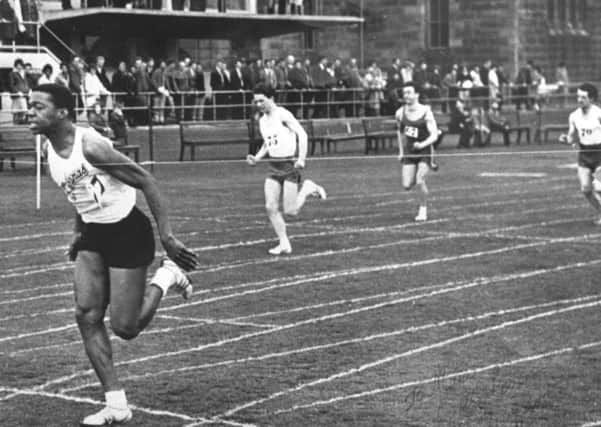Obituary: Bernard J Nottage, Bahamian international sprinter and politician


Bernie Nottage, who has died aged 71, was a top class international sprinter from the Bahamas who brightened up the Scottish athletics scene considerably in the 1960s thanks to the combination of his popular personality and his track prowess.
A medical student at Aberdeen University, he represented them with distinction, winning Scottish and British Universities’ titles several times in their colours. Over three consecutive years, between 1966 and ’68, he won the Scottish Championship at both 100 and 220 yards at a period when the country boasted top drawer performers such as Olympians “Ming” Campbell, Les Piggot and Don Halliday among others. He was only the fourth athlete ever to achieve that feat, following in the footsteps of the great Victorian Alf Downer, Willie Jack in the 1950s and Campbell himself earlier in the same decade.
Advertisement
Hide AdAdvertisement
Hide AdRepresenting his native country in the Pan American Games in Winnipeg in 1967 was arguably the high point of his international career, when he finished a very creditable sixth in the final of a high quality 200 metres.
At the Mexico Olympics in 1968, again running for his country, he competed in both sprints and the relay, helping his team to a new national record, then less than a second outside the world record. On his return to the Bahamas in the early 1970s he became a distinguished gynaecologist and eminent politician, and he was accorded a State funeral.
His best performances were on the fringes of world class and achieved largely on an outsize measure of natural ability.
Essentially self coached, he was never known for an addiction to training and it can only be a matter for speculation what he might have achieved had he been so inclined. Former Aberdeen University teammates recalled him fondly, as well as their bemusement as to how he did so well on minimal training.
Bernie’s medical studies were his priority, although he did find time to enjoy a social life and at one point sang in a band. A smart dresser, it was always known that Bernie was at the track when his expensive suit could be seen hanging up in the changing room at a time when others could not aspire to such tailoring.
A well-built, powerful athlete, he was a formidable presence on tracks here and elsewhere. Les Piggot, who competed in the 1968 and 1972 Olympics, enjoyed a number of duels with him. He commented: “In the best possible sense, he was a bit of a thorn in the flesh for us Scottish sprinters! He had bags of natural ability and a wonderful rhythm to his running. A smashing guy who was also very humble.”
Prior to coming to Aberdeen Bernie had competed for the Bahamas in the 1962 Central American and Caribbean Games, in the sprint relay in a team which set a new national record, but it was really only after coming to Scotland that his athletic career began to fulfil its early potential.
One of his inspirations was his country’s greatest ever sprinter, Tom Robinson, a Commonwealth Games gold and silver medallist with whom he ran in the national relay team at the Mexico Olympics and whose supremacy he sought to challenge. While at Aberdeen Bernie also represented Scotland in four internationals between 1966 and ’69, notching a sprint double in the first against Wales and Midland Counties at Birmingham and contributing to a sprint relay success in 1968 at Grangemouth against England,Wales and Northern Ireland with teammates Merchistonian Ian Turnbull, “Ming” Campbell and Les Piggot.
Advertisement
Hide AdAdvertisement
Hide AdHis early interest in politics, popularity and sporting stature led to Bernie being elected President of Aberdeen University Sports Union, a role he carried out with distinction. Once back in the Bahamas, where he was affectionately known as BJ,he furthered his successful medical career as an obstetrics consultant while also becoming involved in more formal political activity as a member of the Progressive Liberal Party, a centre left entity.
He became an MP and for many years served his constituency of Bains and Grants Town. Bernie’s ability led to his holding several cabinet offices, as minister of health, minister of education and minister of consumer affairs.
Latterly he was the Leader of Government Business in Parliament and Minister of National Security. In that role he developed a number of important initiatives in regard to penal reform, tackling crime and modernisation of the country’s Defence Force fleet for better control of territorial waters. Highly regarded as a politician, Bernie was also noted for his complete integrity and imperviousness to corruption.
While no longer competing on the track, he maintained his interest in his sport by assuming a number of important administrative roles. He became the longest serving President of his country’s amateur athletic association, the chair of the 1976 Carifta Games – the first international event held in the Bahamas – and in 1982 President of the Central American and Caribbean Athletic Federation as the first Bahamian to head a regional sporting association.
His was also an influential voice in IAAF, the international athletic federation, and in 1987 he was one of the leaders of the “one country one vote” campaign.
Serious health issues led to Bernie’s hospitalisation latterly and his being airlifted to the Cleveland clinic in Florida where he died. He is survived by wife Portia, sons Bryan and Patrick and wider family.
JACK DAVIDSON